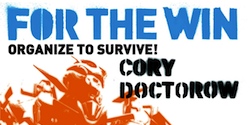For the Win by Cory Doctorow
Milena Popova on the feminism, morality and good ol' fashioned lefty economics of Cory Doctorow's novel For the Win

Although it's been kicking about for a while, I first got my grubby paws on an advance reading copy of For the Win by virtue of—as Granny Gertrude pithily put it—being a web whore – just the kind of girl I'm sure the likes of Cory Doctorow would appreciate. It’s a young adult novel in true Doctorow style. Readers of Little Brother will be familiar with it: action-packed, gritty, polemical, sickening and empowering all at the same time.
For the Win is set in the not-too-distant future. It features a set of diverse teenage protagonists, from the Jewish-American smitten with the idea of China, to Mumbai slum children; from Chinese gold farmers, to an Indonesian union leader called Big Sister Nor.
In a world where some of the largest economies are MMORPGs (Massively Multiplayer Online Role-Playing Games—think World of Warcraft or Second Life—run by multinational corporations, playing for money is big business. The kind of big business conducted in sweatshops in China, India, Singapore, Hong Kong, Kuala Lumpur, Russia, Africa and South America, run by corrupt and criminal kingpins exploiting gaming kids. (And if you think this is the stuff of fiction, have a look at this hilarious way of advertising your farmed gold in WoW and Second Life's US$64 million GDP in 2006.)
Into this toxic mix step two leaders: Big Sister Nor, the union organiser who has moved from real-world factories and unions into the online gaming space, and Jie/Jiandi, the Chinese underground reporter who reestablishes links between gold farmers and Chinese factory workers through her online radio show. As strikes break out in online space, they are joined by striking union workers across China and India. Epic battles are witnessed, both online and off: some are lost, some are won, and the world is left significantly altered.
Themes addressed in this novel are specifically related to economics, resulting in a far more focused product than its predecessor, Little Brother, which covered everything from computer security to city planning. In many ways, this is a child of the credit crunch – Doctorow has one of the best explanations of credit default swaps that I have ever read. This books is bravely—and refreshingly—left-wing in its economics, unfashionable though left-wing economics have become since the end of the Cold War. It bites the bullet that I've been struggling with recently—namely, that while sweatshops are horrible, for the people working in them they're the best option available—and offers a way out. We don't come out with a socialist utopia, but we come out, to quote an obscure 1980s rock band, “a little better than before”, and that's a start.
Something else I like about this book is its spectacularly socialist take on diversity: the only difference that matters is class. We have characters from different nations, different races, different religious backgrounds, different genders and abilities - and they all work together. One of the most passionate passages in the book is Ashok addressing a group of traditional national trade unionists, explaining to them how the national borders they operate in work against them, how the only way to truly achieve something is to work across borders – a statement as true now as it was 160 years ago when the Communist Manifesto was published, and a goal a lot more achievable now than it was back then.
And finally on the diversity note, does this book pass the Bechdel test? (Recap for non-feminists: In order to pass the Bechdel Test you must: 1. feature at least two women, 2. have them talk to each other, and 3. talk about something other than a man.) For the Win aces the test. There is, roughly, a 50/50 gender split in main characters and women are as much part of the action as the men. What’s more is that they are portrayed as competent and passionate; they drive the plot forward, lead real world trade unions and gamespace armies, and talk to each other about politics and economics, justice, work, and life. Somewhat tragically, this places this book in a premiere league almost all on its own.
Milena is an economics & politics graduate, an IT manager, and a campaigner for digital rights, electoral reform and women's rights. She tweets as @elmyra.

Latest Articles
Featured Article
Schmidt Happens

Wendy M. Grossman responds to "loopy" statements made by Google Executive Chairman Eric Schmidt in regards to censorship and encryption.
ORGZine: the Digital Rights magazine written for and by Open Rights Group supporters and engaged experts expressing their personal views
People who have written us are: campaigners, inventors, legal professionals , artists, writers, curators and publishers, technology experts, volunteers, think tanks, MPs, journalists and ORG supporters.





